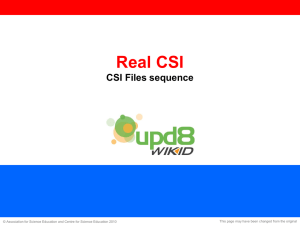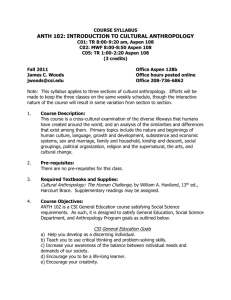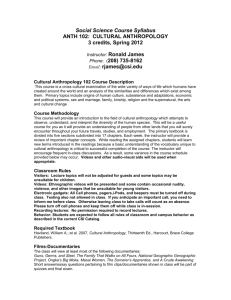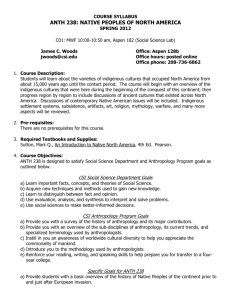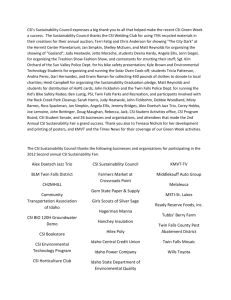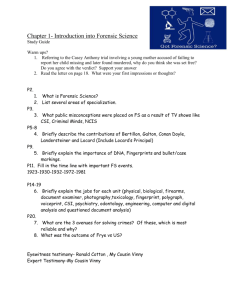ANTH 102: Introduction to Cultural Anthropology
advertisement
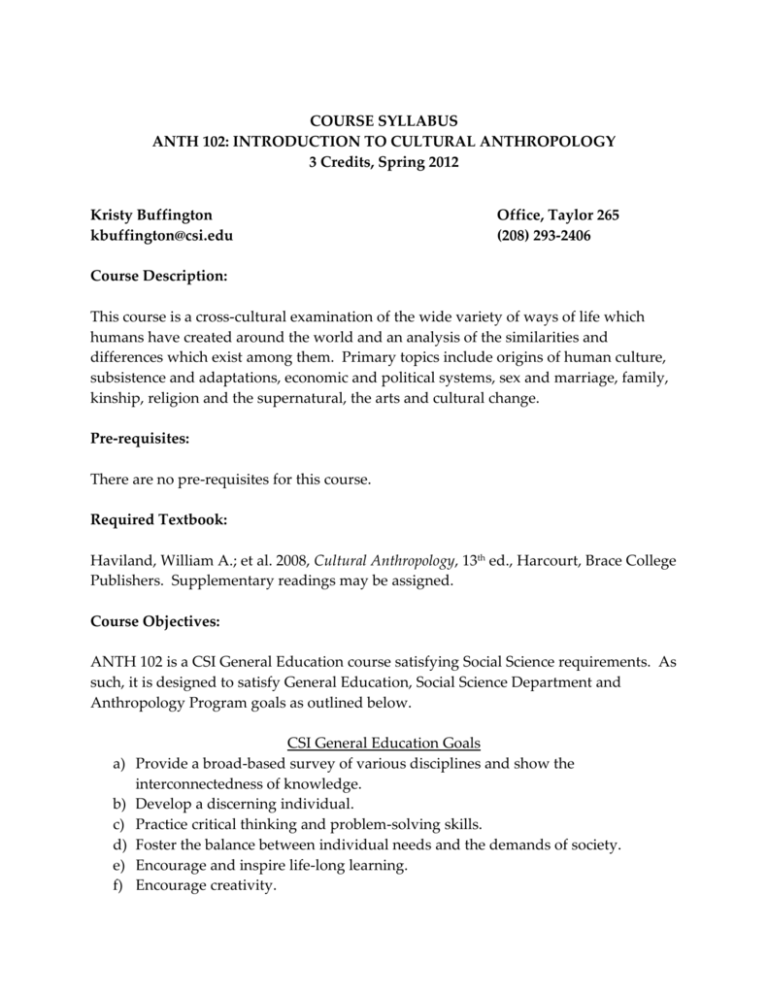
COURSE SYLLABUS ANTH 102: INTRODUCTION TO CULTURAL ANTHROPOLOGY 3 Credits, Spring 2012 Kristy Buffington kbuffington@csi.edu Office, Taylor 265 (208) 293-2406 Course Description: This course is a cross-cultural examination of the wide variety of ways of life which humans have created around the world and an analysis of the similarities and differences which exist among them. Primary topics include origins of human culture, subsistence and adaptations, economic and political systems, sex and marriage, family, kinship, religion and the supernatural, the arts and cultural change. Pre-requisites: There are no pre-requisites for this course. Required Textbook: Haviland, William A.; et al. 2008, Cultural Anthropology, 13th ed., Harcourt, Brace College Publishers. Supplementary readings may be assigned. Course Objectives: ANTH 102 is a CSI General Education course satisfying Social Science requirements. As such, it is designed to satisfy General Education, Social Science Department and Anthropology Program goals as outlined below. a) b) c) d) e) f) CSI General Education Goals Provide a broad-based survey of various disciplines and show the interconnectedness of knowledge. Develop a discerning individual. Practice critical thinking and problem-solving skills. Foster the balance between individual needs and the demands of society. Encourage and inspire life-long learning. Encourage creativity. CSI Social Science Department Goals a) b) c) d) e) Learn important facts, concepts, and theories of Social Science. Acquire new techniques and methods used to gain new knowledge. Learn to distinguish between fact and opinion. Use evaluation, analysis, and synthesis to interpret and solve problems. Use social sciences to make better-informed decisions. CSI Anthropology Program Goals a) Provide a survey of the history of anthropology and its major contributors. b) Provide an overview of the sub-disciplines of anthropology, its current trends, and specialized terminology used by anthropologists. c) Promote awareness of social and cultural diversity in order to appreciate the commonality of all people. d) Introduce the methodology used by anthropologists. e) Reinforce reading, writing, and speaking skills in preparation for transfer to a four-year college or university. Cultural Anthropology 102 Goals a) Provide a basic understanding of the historical development of the science of anthropology and some of the discipline’s major contributors. b) Help distinguish between scientific and pseudoscientific explanations of human behavior. c) Learn contemporary theories used in cultural anthropology. d) Learn the terminology used by anthropologists. e) Highlight the diversity of human culture and cultural practices worldwide. f) Prepare for transfer to an upper division program elsewhere. Policies and Procedures: a. Attendance policy: Attendance is required for this course. In accordance with CSI policies, school-sanctioned absences will not count against you if advance notice is provided. CSI attendance/withdrawal policy states: a. If you fail to show up the first week of school, you will be dropped by the instructor. You may qualify for a refund and you will not receive a ‘W’ on your transcript. b. You can still withdraw the second week of school, but will get a ‘W’ on your transcript. You will not be eligible for a refund, and you cannot be reinstated. Faculty can drop students this week for ‘no show.’ c. During the third week and until April 6, 2012, students can withdraw from class but will receive a ‘W’ on their transcript. After the second week, faculty cannot drop students, only issue letter grades. b. Class Structure: Approximately one chapter will be reviewed each week. The instructor will provide a review of chapter readings and facilitate discussions using projected lecture notes and other visual aids. Videos, slide programs, demonstrations, and supplemental readings will also be used when appropriate. An active interchange between all students and the instructor will be encouraged. c. Plagiarism: Plagiarism and other forms of cheating are violations of the honesty policy found in the CSI General Catalog. Violators will receive a zero for the work in question. d. Texting and Cell phones: Please turn off cell phones and keep them off while class is in-session. Texting or personal music devices are also not allowed. e. Behavior: Students are expected to follow all rules of classroom and campus behavior as described in the current CSI Catalog. f. CSI E-mail: E-mail is the primary source of written communication with all CSI students. Students automatically get a CSI e-mail account when they register for courses. Messages from instructors and various offices such as Admission and Records, Advising, Financial Aid, Scholarships, etc. will be sent to the students’ CSI accounts (NOT their personal e-mail accounts). It is the students’ responsibility to check their CSI e-mail accounts regularly. Failing to do so will result in missing important messages and deadlines. Students can check their CSI e-mail online at http://eaglemail.csi.edu. Student e-mail addresses have the following format: username@eaglemail.csi.edu. At the beginning of each semester free training sessions will be offered to students who need help using their CSI e-mail accounts. g. On-line Course Evaluation: Students are strongly encouraged to complete evaluations at the end of the course. Evaluations are very important to assist the teaching staff to continually improve the course. Evaluations are available online at http://evaluation.csi.edu. Evaluations open two weeks prior to the end of the course. The last day to complete an evaluation is the last day of the course. During the time the evaluations are open, students can complete the course evaluations at their convenience from any computer with Internet access, including in the open lab in the library and in the SUB. When students log in they should see the evaluations for the courses in which they are enrolled. Evaluations are anonymous. Filling out the evaluation should only take a few minutes. Your honest feedback is greatly appreciated! h. Disabilities: Any student with a documented disability may be eligible for related accommodations. To determine eligibility and secure services, students should contact the coordinator of Disability Services at their first opportunity after registration for a class. Student Disability Services is located on the second floor of the Taylor Building on the Twin Falls Campus, 208-732-6250 (V) or email Scott Scholes, sscholes@csi.edu. i. Dropping a Course: It is the student’s responsibility to drop the course. A student may drop a course or all courses prior to the end of late registration (first Friday of the term) without it being recorded on the student’s official transcript. A student initiated drop after the late registration period is considered a withdrawal, and results in the grade of ‘W’. Students may drop courses online until the end of the late registration period. In order to withdraw from one or more courses following late registration, a complete registration form is required. Instructions on the form indicate when a signature of instructor and/or Financial Aid advisor is required. The completed form may be submitted to Admissions & Records or any offcampus center. Students may withdraw from courses which are less than a full semester in length until 75% of the course meetings have elapsed. No course may be withdrawn from after 75% of the course has elapsed. Grading: Final grades are derived from total points earned from quizzes, final test, in-class exercises/response papers, and a final paper. Points will be assigned as follows: Quizzes (3 @ 50 = 150 pts.), Response papers/in-class activities (10 @ 25 = 250 pts.), Final Exam (250 pts.), Final paper (250 pts.), In-class participation (100 pts.), TOTAL 1,000 points (no extra credit). a. Quizzes (150 points): Four 50 point quizzes will be assigned. Quizzes may vary in format including a mixture of matching, multiple choice, and essay questions. The lowest of the four quiz scores will be dropped. b. In-class activities/Response papers (250 points): A total of ten response papers will be written during the semester. Response papers are written in response to supplemental readings, activities, or ethnographic films viewed during class. Response papers are short (two to four paragraphs, single-spaced) summarizing the reading/film/activity and your opinion or response to that particular topic. NO LATE response papers accepted. c. Final Exam (250 points): A comprehensive final exam worth 250 points will be given during finals week. This exam is designed to assess your knowledge of basic anthropological themes and issues. d. Final Paper (250 points): Investigate a topic or subject that is of interest to you but that are unfamiliar with and write a short ethnography. A final written paper will provide you with a closer look at: a) a specific culture or society, or b) a view of how cultural anthropologists conduct ethnographic fieldwork and report results of their research. Your final paper will be graded using the following scale: Completeness: Is the topic adequately summarized? Structure: Is there an introduction, supporting documentation, references, and a conclusion? Analysis: How does this relates to what you learned in this course? Quality of Information: Information and sources clearly relate to topic and includes several supporting details and/or examples. Papers should be five to six pages including a title page but not counting illustrations or the works cited page. Sources must be cited in-text and listed on a separate Works Cited page. Use either MLA or APA format. Papers must be typed, 12 point font, one inch margins, and double-spaced. Please bind with a staple (do not use paper clips or plastic covers). An excellent assortment of related readings and sources for final papers are available at the CSI library. Additional readings are available at the Eccles Library in the Herrett Center, though the Eccles sources can only be used at the Herrett Center. CSI Meyerhoeffer Library: The Meyerhoeffer Library is open during the school year Monday through Thursday, 7:30 a.m. – 10:00 p.m., Friday 7:30 a.m. – 6 p.m., and Saturdays and Sundays, 10:00 a.m. – 5 p.m. Herrett Center Eccles Library: Eccles Library is open during the school year, Tuesday and Friday, 9:30 a.m. – 9:00 p.m., Wednesday and Thursday, 9:30 a.m. – 4:30 p.m., and Saturday, 1:00 p.m. – 9:00 p.m. The library is closed Sundays, Mondays, and federal holidays. Students wishing to use the Eccles Library can check in at the reception desk without an appointment. e. Participation (100 points): It is your responsibility to keep current with the readings. Please be aware that you are expected to read the assigned pages BEFORE the class meets so you can participate in class discussions. Spring 2012 Schedule (Dates may change due to class discussion, etc.): Dates* Jan. 18 Jan. 23/25 Jan. 30/Feb. 1 Feb. 6/8 CH 1 2 3 4 Feb. 13/15 Feb. 20 Feb. 22 Feb. 27/29 March 5/7 March 12/14 5 March 19/21 March 26/28 April 2/4 10 April 9/11 12 April 16/18 April 23/25 13 14 April 30/May 2 15 &16 May 7 6 7 8 9 11 Lecture/Discussion Topics The Essence of Anthropology Characteristics of Culture Ethnographic Research: History, Methods, Theories FIRST QUIZ, Chapters 1-3, Becoming Human: Origin and Diversity of our Species Language and Communication NO School, President’s Day Social Identity PAPER TOPIC DUE, Patterns of Subsistence Economic Systems SECOND QUIZ, Chapters 4-8, Sex, Marriage and Family Kinship and Descent NO School, Spring Break PAPER REFERENCES DUE, Grouping by Sex, Age, Common Interest, and Class THIRD QUIZ, Chapters 9-11, Political Organization Religion and the Supernatural FOURTH QUIZ, Chapters 12-14, The Arts FINAL PAPER DUE & SHORT PRESENTATIONS, Processes of Change and the Role of Anthropology Final Exam

